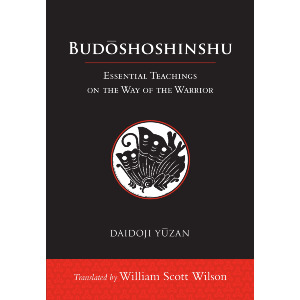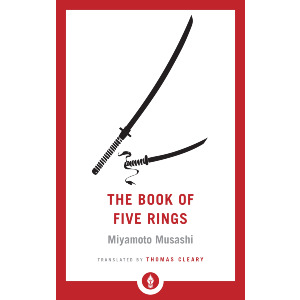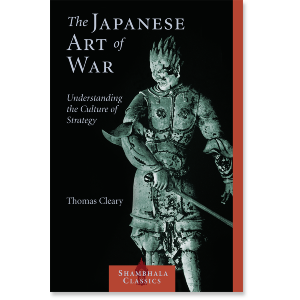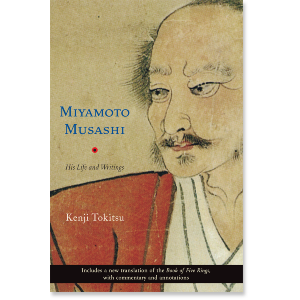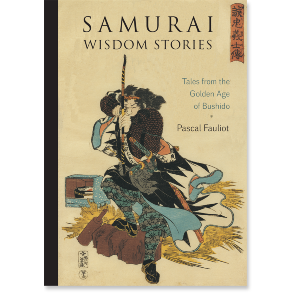An Excerpt from Budōshoshinshu
Budōshoshinshuand Hagakureare the most influential treatises on samurai philosophy from the Edo period. The two books were written at about the same time and both address the warrior’s role in times of peace. While Hagakure was mostly a secret book of the Nabeshima clan until the twentieth century, Budōshoshinshu was widely available almost from the start. It was a text meant for the younger samurai, as the literal translation of the title, “collection for beginners in the way of the warrior,” suggests.
Chapter 5: A Sense of Shame Will Uphold Justice
Bushidō is established when a man who would be a warrior has a solemn understanding of justice and injustice, and the absolute resolution to strive in the former and avoid conduct in the latter. Justice and injustice are defined as good and evil, justice being nothing other than good, injustice being nothing other than evil. Although men are not always able to distinguish good from evil or justice from injustice, often they consider the performance of justice and the advancement of good as confining and troublesome, and the achievement of injustice and evil as interesting and easy. Thus, they devote themselves to injustice and evil, and find the performance of justice and the advancement of good to be distasteful.
If a man is a simpleton, unable to distinguish right from wrong or justice from injustice, it is one thing. But a man who has understood in his heart the evil of injustice and then turns his back on duty and commits acts of injustice anyway does not possess the character of a warrior. This is an extremely regrettable situation.
It can be said that a shallowness of forbearance is the source of such unjust acts. Although the phrase “shallowness of forbearance” does not seem so bad, when one looks at its root, he will understand injustice arises from cowardice. Thus, it is said to be essential for a warrior always to avoid injustice and to act justly.
Now, there would seem to be three levels of what is called “acting according to justice.” As an example, say you are going out with an acquaintance to some place or another, and your companion has brought with him one hundred ryo in cash. As it would be inconvenient for him to walk around with it in his pocket, he entrusts it to your keeping until returning, and thus you become the secret recipient of that money. But before you leave together, the man is suddenly stricken with food poisoning or apoplexy and dies on the spot, with not a soul knowing that money passed between the two of you.
In such a situation, a man who acted justly would be pained by the circumstances and, without the least evil in mind, would explain the matter of the entrusted money to the man’s relations and quickly return it to them.
Next, there is the person who would reason that the man was just an acquaintance and hardly anyone with whom he was familiar or intimate. Moreover, as no one knew about the money, no one would be likely to inquire about it later. This was a convenient event, since his circumstances were rather pressed, and it would not hurt to keep the money himself. To have such evil thoughts, but then to feel their sordidness and a sense of self-revulsion, and to return the money in the end, is to feel shame in one’s heart and act with justice.
Finally, there is the man who returns the money when there is at least one person among his family and servants who knows about the entrustment of money, and who is ashamed of that person’s opinion or afraid of rumors in the future. This is said to be having a sense of shame before others and acting with justice. Although there is some doubt as to what such a man would do if no one knew of the money, it can be said that he is a man who knows what justice is and acts accordingly.
Justice and injustice are defined as good and evil, justice being nothing other than good, injustice being nothing other than evil.
Generally, an understanding of behaving justly originates with a sense of shame before the deep scorn of one’s intimates, beginning with one’s family and servants, which in turn widens to shame before the derision and scorn of others. When a man practices justice and avoids injustice in this way, it is certain that the practice itself will become a mental habit, and later he should possess a disposition for enjoying justice and hating injustice.
In the Way of martial valor as well, a man of natural valor will advance on the battlefield no matter how violent the rain of arrows and gunfire, with no thoughts at all, immersed in loyalty and duty, making a target of his own body. When the valor of such a mind manifests itself, there is nothing further to be said about our admiration for the man’s conduct.
Again, according to the individual, there are those who get weak in the knees and fainthearted, wondering how best to act in such dangerous situations. Nevertheless, as they will be seen by their allies as the only ones who remain while those around them advance, and will be unable to make excuses later, they are compelled to make up their minds and advance along with the previously mentioned valiant men. Such men are far inferior to those who are naturally courageous. Yet even they, meeting with such conditions many times, repeating the experience and becoming used to it, will become strong warriors of praiseworthy deeds, in no way second-rate to those born brave.
Thus, it is said that there is no principle better than a sense of shame for acting with justice and striving with courage. But there is nothing that can be taught to the man who acts unjustly, ignoring the accusations of others, or who continues to commit deeds of cowardice, regardless of the derision and condemnation of his unmanliness.
These words are for the understanding of those who would be warriors.
Chapter 6: In the Mind, the Way; in Form, the Law
The study of the Way of the Warrior is nothing other than inwardly regulating the mind according to the Way and outwardly preserving the Law in form.
Regulating the mind according to the Way is understanding that one manages his affairs following the justice and correctness of the Way of the Warrior, and does not diverge a hair’s breadth into unrighteousness or evil ways. Thus, it is quite proper to meet with men of virtue, learned in the works and traditions of the sages, to study in detail the stories of the Way.
Regarding preserving the Law in form, there are two Laws and four levels. The two Laws are the Law of Normal Conditions and the Law of Altercation. The four levels include, within the Law of Normal Conditions, the Gentleman’s Code [士法] and the Martial Arts [兵法], and within the Law of Altercation, Martial Law [軍法] and Combat Strategy [戦法].
A warrior accomplished in the knowledge of the four levels of the Law of Normal Conditions and the Law of Altercation is said to be a samurai of the highest quality.
First, the Gentleman’s Code is in bathing in the morning and at night, washing one’s hands and feet, and keeping one’s body clean. Early each morning, the Gentleman should bind up his hair, from time to time shaving his forehead. He should wear the correct clothing according to the season, and carry his long and short swords. Things of this nature go without saying. He should also carry a fan at his waist, even in cold weather. In meeting with guests, the Gentleman should observe the length and breadth of courtesy according to the guest’s social position and take care not to speak useless words.
Even in partaking of a single bowl of rice or cup of tea, one should be prudent to do so in a skillful way, avoiding carelessness. If a man is serving as a retainer, whenever he is off duty or resting, he should learn something from a book or practice writing, rather than just sitting around. Beyond that, he should impress in his mind the old ways of the warrior clans. Whether coming or going, sitting or sleeping, he should carry himself so that his actions and manners befit a warrior.
Next are the Martial Arts. Although there is nothing lacking in the Gentleman’s Code, a man’s basic purpose as a Gentleman Warrior [武士, bushi] is to train in the usage of arms. Thus, one should be determined to begin by unsheathing the sword at his waist and learning what it is to fight. He should pursue training in all the martial arts—whether handling the spear, horsemanship, archery, or riflery—attaining his own measure of skill.
If a man will advance and discipline himself in the levels of the Gentleman’s Code and the Martial Arts, he will not be lacking in the Law of Normal Conditions, and will be considered a good and useful warrior by most people.
Be this as it may, the warrior is a man who serves at times of altercations, which are matters of social disturbance. At such times, a man puts on armor without ceremony and must put aside for a while the usual Gentleman’s Code. Men who are ordinarily called “lord” and “master” are now called “general,” and samurai retainers of both high and low rank are called “soldiers” and “troops.” Both high and low doff formal dress, don armor, grasp the soldier’s staff, and advance toward the enemy. This is the condition of the battle camp. The various methods and measures concerning these things are called Martial Law, and a warrior should not be without this knowledge.
Finally, there is Combat Strategy. When one’s enemies and allies are at the point of battle, these strategies are the determinants of victory, when one has correctly judged his allies’ prepared dispositions and the deployment of their numbers, or [are the determinants of] defeat, when he has managed these conditions poorly. The practices and secret traditions of these various methods and measures are called Combat Strategy, and a warrior should also possess this knowledge.
A warrior accomplished in the knowledge of the four levels of the Law of Normal Conditions and the Law of Altercation is said to be a samurai of the highest quality.
Although a warrior will get by as an individual preparing himself only in the Law of Normal Conditions, if he has only a superficial understanding of the two levels of the Law of Altercation, he will be useless in such important roles as general, group leader, or administrator.
It is essential that a warrior aim beyond himself to think these points over well and, as a warrior, train himself in the disciplines of Martial Law and Combat Strategy, as well as the Gentleman’s Code and the Martial Arts. He should never put aside his aim of eventually becoming a first-class samurai.
These words are for the awareness of those intending to be warriors.
Share
Related Books
$19.95 - Hardcover
$22.95 - Hardcover
$14.95 - Paperback
$21.95 - Paperback
$39.95 - Paperback
$17.95 - Paperback
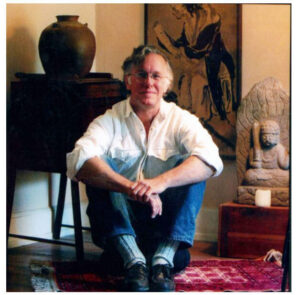
William Scott Wilson is the foremost English translator of traditional Japanese texts on samurai culture. Learn more.



